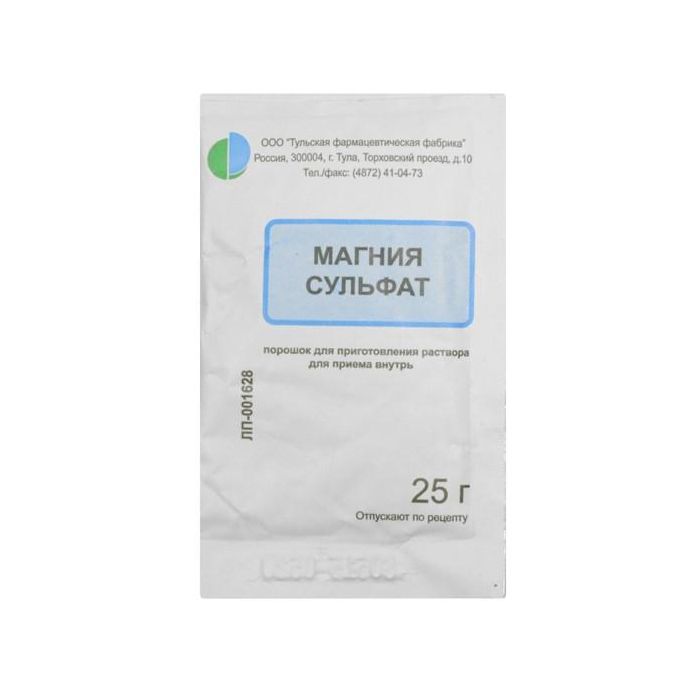magnesium sulfate | Magnesium sulfate powder for oral administration, 25 g
Special Price
$13.72
Regular Price
$21.00
In stock
SKU
BID472176
Release form
Powder for preparation of solution
Packing
Bank of 25 g
Pharmacological action
Magnesium sulfate has a laxative effect.
When administered, it has a choleretic (reflex effect on the receptors of the mucous membrane of the duodenum) and laxative effect (due to poor absorption of the drug in the intestine, it creates high osmotic pressure, water accumulates in the intestine, intestinal contents become liquefied, and peristalsis increases). It is an antidote for poisoning with salts of heavy metals. The onset of the effect is in 0.5-3 hours, the duration is 4-6 hours.
When administered parenterally, it has a hypotensive, sedative and anticonvulsant effect, as well as diuretic, arterial dilating, antiarrhythmic, vasodilating (on arteries), in high doses - curare-like (depressing effect on neuromuscular transmission), tocolytic, hypnotic and narcotic effects, suppresses the respiratory center. Magnesium is a physiological blocker of slow calcium channels and is able to displace it from binding sites. Regulates metabolic processes, interneuronal transmission and muscle excitability, prevents the flow of calcium through the presynaptic membrane, reduces the amount of acetylcholine in the peripheral nervous system and central nervous system. It relaxes smooth muscles, reduces blood pressure (mainly increased), increases diuresis.
The mechanism of anticonvulsant action is associated with a decrease in the release of acetylcholine from neuromuscular synapses, while magnesium inhibits neuromuscular transmission and has a direct inhibitory effect on the central nervous system.
Antiarrhythmic action of magnesium is caused by a decrease in the excitability of cardiomyocytes, restoration of ion equilibrium, stabilization of cell membranes, disruption of sodium current, slow incoming calcium current and one-way potassium current. The cardioprotective effect is due to the expansion of the coronary arteries, a decrease in OPSS and platelet aggregation.
A tocolytic effect develops as a result of suppression of the contractility of the myometrium (decreased absorption, binding and distribution of calcium in smooth muscle cells) under the influence of a magnesium ion, increased blood flow in the uterus as a result of the expansion of its vessels. Magnesium is an antidote for poisoning with salts of heavy metals.
Systemic effects develop almost instantly after i / v and 1 hour after i / m administration. The duration of the action with the on / in the introduction is 30 minutes, with i / m - 3-4 hours.
Pharmacokinetics
After oral administration, no more than 20% of the dose is absorbed.
Css, in which an anticonvulsant effect develops, is - 2-3.5 mmol / L.
Crosses the BBB and the placental barrier, excreted in breast milk with a concentration of 2 times the concentration in plasma. It is excreted by the kidneys, the rate of renal excretion is proportional to the concentration in the plasma and the level of glomerular filtration.
Indications
Magnesium sulfate is used as a laxative (occasionally) to prepare for the study of the large intestine.
Contraindications
Individual intolerance to magnesium sulfate hypermagnesemia.
Use during pregnancy and lactation
During pregnancy, magnesium sulfate is used with caution, only in cases when the expected therapeutic effect exceeds the potential risk to the fetus.
If necessary, use during lactation, breast-feeding should be discontinued.
Composition
1 can (sachet) contains:
Active ingredient: magnesium sulfate heptahydrate 25 g.
Dosage and administration
Magnesium sulfate is taken orally.
Adults - 15-25 g once a day on an empty stomach, after dissolving the drug in a glass of water (250 ml).
For children over 12 years old - 10 g once a day (for 1/2 cup of water).
For children aged 6-12 years - from 5 to 10 g (i.e., from half to a whole volume of solution prepared at the rate of 10 g per 1/2 glass of water).
In children under 6 years of age, the drug can be used only as directed by a doctor.
Daily doses of Magnesium sulfate are determined at the rate of 1g for 1 year of life.
Perhaps the use of the drug in the form of enemas (50-100 ml of a 20-30% solution).
Side effects
Allergic reactions, colicky abdominal pain, flatulence are possible.
Drug Interaction
Reduces the effect of oral anticoagulants (including coumarin derivatives or indandiol derivatives), cardiac glycosides, phenothiazines, (especially chlorpromazine).
Reduces the absorption of ciprofloxacin, etidronic acid, antibiotics of the tetracycline group, attenuates the effect of streptomycin and tobramycin (laxatives containing magnesium should be taken 1-2 hours after administration of the above drugs).
Pharmaceutically incompatible (precipitate is formed) with calcium, ethanol (in high concentrations), carbonates, hydrocarbons and alkaline phosphates, salts of arsenic acid, barium, strontium, clindamycin, hydrocortisol, polycytamycin, polycytamycyl
Overdose
Symptoms: respiratory depression, CNS function depression, up to anesthesia.
Treatment: as an antidote for overdosage of magnesium sulfate use calcium preparations - calcium chloride or calcium gluconate.
Storage conditions
Store in a dry, out of reach of children, protected from light.
Expiration
5 Chron
Terms of delivery from pharmacies
Over-the-counter
Dosage Form A dosage form for receiving powder
inside
Tula farmfabrika, Russia
Write Your Own Review

